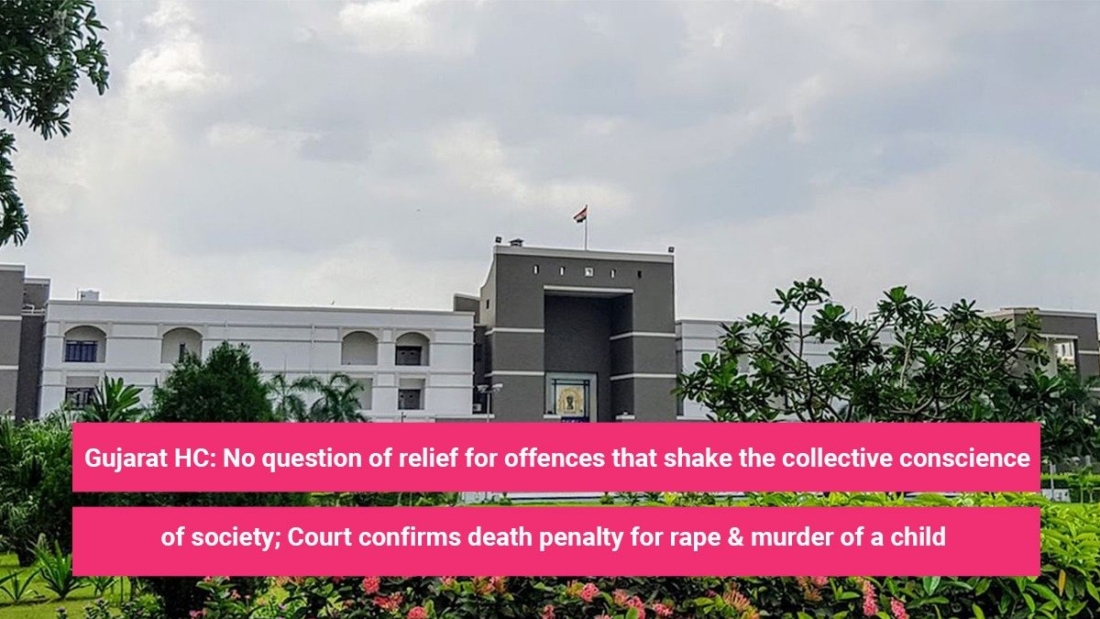In Anil Surendra Singh Yadav vs State of Gujarat [R/Criminal Appeal No. 1973 of 2019 and R/Criminal Confirmation Case No. 2 of 2019, Decided on 27 December 2019], the Division Bench of Bela M. Trivedi and A.C. Rao, JJ., simultaneously heard the petition for appeal by the accused as well as submissions made by Special Court for confirmation of death penalty.
The facts of the case are that the appellant-accused was residing on the ground floor of the house and the complainant (father of the victim) along with his family had been residing in the same building on the first floor as a tenant. The appellant-accused on 14 October 2018 between 8:00 -8.30 PM kidnapped the victim aged about 3 years and 6 months, took her to his room, committed rape on her and killed her by throttling. Thereafter, in order to destroy the evidence, the appellant-accused put the body of the victim in a gunny bag in his room, locked the room from outside and fled away. On not being able to locate his daughter, the complainant filed a missing report in the police station. Subsequently, during the inquiry conducted by the Investigating Officer, the said room’s lock was broken, and the victim’s corpse was found in a gunny bag in a decayed and decomposed condition.
The complaint was accordingly primarily registered for the offences under Sections 302 (punishment for murder), 363, 366 (kidnapping), 376AB (punishment for rape on woman under 12 years of age), 377 (unnatural offences), and 201 (causing disappearance of evidence of offence) of the Indian Penal Code and under Sections 3 and 4 (penetrative sexual assault), and Sections 5(a), 5(r) and 6 (aggravated penetrative sexual assault with an attempt to murder the child) of the Protection of Children from Sexual Offences Act, 2012 (“POCSO Act”).
After appreciating the evidence on record, the Special Court convicted and sentenced the accused to death penalty – this was challenged in the current petition. Among other documents/witnesses, the crucial examination of the witness who had carried out the postmortem clearly suggested that the death of the victim was homicidal death after sexual assault, the death was asphyxia caused due to pressure on the neck, and the death took place 12-36 hours prior to carrying out the postmortem. The DNA profile and other scientific investigations also indicated that the accused was involved with the crime.
The Court was of the opinion that while the appellant-accused was given an opportunity to explain the incriminating circumstances, he not only failed to explain the same, but also showed no regret or repentance. The Court held that the prosecution led by its unimpeachable, cogent, trustworthy and credible evidence had conclusively proved the guilt of the appellant-accused beyond reasonable doubt.
Further, on re-consideration of the sentence of death penalty, the counsel for the appellant-accused, while relying on the cases of Bachan Singh v. State of Punjab [(1980) 2 SCC 684], and Machhi Singh and Ors. v. State of Punjab [(1983) 3 SCC 470], argued that life imprisonment is the rule and death penalty should be awarded only as an exception in the gravest cases, after drawing up a balance sheet of aggravating and mitigating circumstances. The Court stated that if it had to draw up a balance sheet, the scale of justice tilted against the appellant-accused. The abhorrent and atrocious nature of crime committed by the appellant/accused in diabolical manner, on the defenseless unprotected girl of 3½ years, without any remorse, left the Court with no option but to consider the case as the “rarest of rare case” for awarding the punishment of death penalty – “such crimes do not only reflect the abusive facet of human conduct but also shock collective conscience of the society”.
The Court remarked that the amendment to Section 6 of the POCSO Act, with effect from 16 August 2019, to incorporate the punishment of death penalty for ‘aggravated penetrative sexual assault’ reinforces the desirability of capital punishment for heinous crimes. Further, the Court believed that, in light of the increasing crimes of heinous nature against the young girls, and in response to the society’s cry for justice against the criminals, and to have deterrence in the society, the culpability of the appellant-accused deserves to be awarded extreme penalty. Accordingly, the Court dismissed the appeal petition and confirmed the death penalty awarded to the appellant-accused by the Special Court.
By way of an update, currently, the Supreme Court has ordered (on 20 February 2020) a stay on executing the sentence of death against the accused – this is after an appeal was filed by him before the Supreme Court under Special Leave to Appeal (Crl.) Nos. 1462-1463/2020.
– Aakriti Chokhani, Advocate & Associate, Child Safety at Work & Vaishali Jain, Paralegal, Child Safety at Work
 Cart is empty
Cart is empty 

